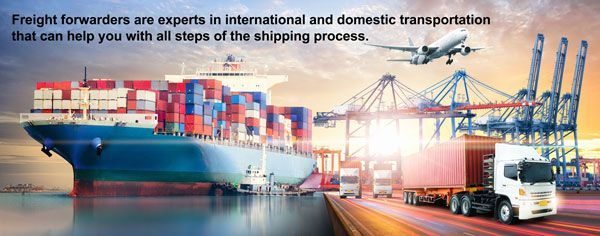What is a Freight Forwarder? what they do
Muhsin kayikci • Jan 07, 2024
This is a subtitle for your new post

Unlocking the Role of Freight Forwarders: Streamlining Global Shipping for Your Business
Have you ever marveled at how companies effortlessly ship goods worldwide? That's the magic of freight forwarders. They operate behind the scenes, ensuring a smooth and cost-effective shipping process.
Shipping goods internationally can be daunting, but freight forwarders alleviate this burden. They handle distribution, ensuring your imports and exports sail through seamlessly. In this article, we explore why partnering with them as an Alibaba seller is a game-changer, industries benefiting from freight forwarders, and essential insights into freight forwarding.
Table of Contents
What is a Freight Forwarder?
Pros and Cons of Using Freight Forwarders
Freight Forwarding Services
How to Start a Freight Forwarding Business
FAQs
Contact with Alibaba.com
What is a Freight Forwarder?
Freight forwarders facilitate the transportation of goods from one location to another for businesses and individuals. They transcend mere shipping; it's about orchestrating seamless commodity transfers. Acting as intermediaries among shippers, carriers, and customs officials, they manage:
Transportation via air or sea.
Goods movement from origin to destination.
Necessary shipping paperwork.
Storage services.
Cargo insurance and customs adherence.
The freight forwarding market, valued at $192.5 billion in 2021, is projected to surpass $285 billion by 2031. The Council of Supply Chain Management Professionals revealed that American businesses spent $1.63 trillion on logistics expenses in 2019.
Is a freight forwarder the same as a freight broker?
Though both facilitate product transportation, they differ. Forwarders manage logistics, documentation, and transportation modes. Brokers connect shippers and carriers, focusing on rates, contracts, and communication, without direct product control.
Different Types of Freight Forwarders
Ocean Freight Forwarders: Specialists in sea-based shipments, handling port operations, and container logistics. 80% of internationally transported goods travel by sea.
Air Freight Forwarders: Focused on air-based shipments, adept in airline regulations and cargo operations.
Trucking Freight Forwarders: Experts in domestic freight, handling goods via road transport. Trucks carried 60.8% of all freight by weight in 2018.
Pros and Cons of Using Freight Forwarders
Pros
Professional Experience:
Freight forwarders offer specialized expertise, efficiently managing complex operations and ensuring customs clearance and timely delivery. They optimize routes and provide packaging advice.
Swiftness: They coordinate deliveries across the supply chain, handling multiple carriers and solving potential delays, such as customs issues, swiftly.
Compliance:
With legal experts on board, they navigate complex international regulations, ensuring goods never encounter legal entanglements.
Assurance of Delivery:
Providing insurance and taking custody of the freight, they bear legal responsibility for its safety.
Flexibility and Cost Optimization:
Adapting to client needs, they offer tailored services and negotiate better rates due to constant shipping, granting small businesses access to cost efficiencies.
Cons
Initial Costs:
Using freight forwarders might require significant upfront expenses, potentially impacting short-term profits.
Trust Issues:
Entrusting goods to a third party involves relinquishing direct control until delivery, posing potential trust challenges.
Risk of Loss:
Operated through networks, losses due to differing regulations in certain regions can occur, potentially leading to time-consuming claim processes.
Freight Forwarding Services
Freight forwarding services aim to simplify logistics. They assist in:
Documentation for International Shipping:
Handling paperwork like commercial invoices and customs declarations.
Shipment Insurance:
Arranging cargo insurance to protect goods in transit.
Inventory Management:
Monitoring and managing goods flow along the supply chain.
Scheduling Cargo Space:
Reserving space on various transportation modes to ensure timely deliveries.
These services relieve stress, allowing businesses to focus on other aspects while ensuring an orderly shipping process.
How to Start a Freight Forwarding Business
Research and Planning:
Develop a comprehensive business plan, understanding international trade, technological trends, and market analysis.
Choose Organizational Structure:
Decide on the legal structure for your business and register with the government.
Obtain Licenses and Permits:
Acquire necessary licenses, considering international trade permits and specialized authorizations.
Establish Trustworthy Partnerships:
Network with reliable industry partners and vendors to ensure smooth operations.
Invest in Quality Software and Customer Satisfaction:
Invest in software, clear customer service policies, and monitor competition for continuous improvement.
FAQs
What is a freight forwarder, and what do they do?
A freight forwarder orchestrates shipments' transportation, negotiating pricing, routes, and compliance with international regulations.
How can a freight forwarder improve my shipment process?
By managing logistics, coordinating transportation, handling paperwork, and ensuring cost-effective solutions for timely and secure deliveries.
What paperwork is involved with using a freight forwarder?
Paperwork includes a Bill of Lading, commercial invoices, inspection certificates, export licenses, and additional instructions.
What distinguishes a good freight forwarder from a bad one?
Effective communication, global network reliability, comprehensive knowledge of regulations, and meeting deadlines set apart a good forwarder.
© 2024
All Rights Reserved | SMARTSEEK

